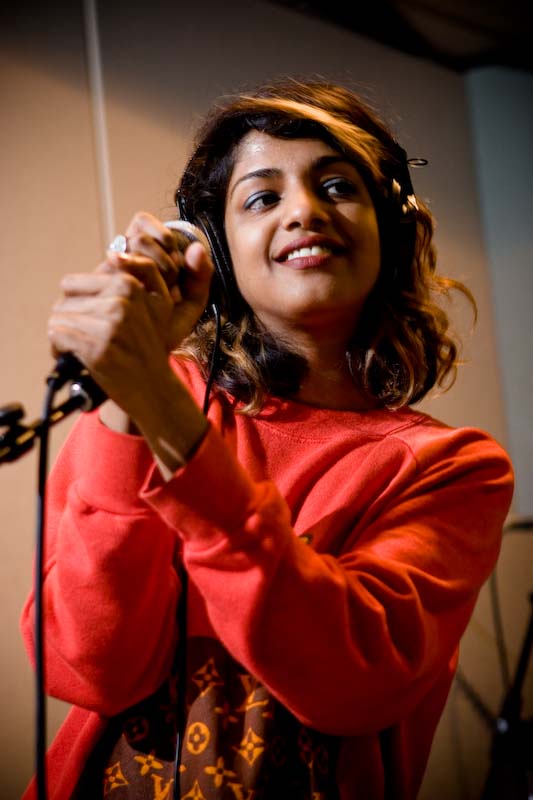
We’re speeding down the highway, sun beaming through the windshield like a laser beam. My friend Nate and I are rushing toward Eastern Washington, trying to make sure we get to the Sasquatch! Music Festival in time to catch every act we can. Nate’s driving and asks me to grab his iPod.
“Do you know M.I.A.? You’ve got to hear this song,” he says, or at least something to that effect.
A dual guitar and bass-line stutter through the speakers, almost like a CD skip but way too rhythmic and catchy to be a mistake. The bass drum begins to pound. A shrieking tremolo sears high above the fray. Then, finally, M.I.A. herself appears.
”I fly like paper, get high like planes,” she raps. “If you catch me at the border I got visas in my name.”
By the time we get to the gunshots and cash register sound effects on the chorus, I’m in gleeful ecstasy. The song scratched an itch I didn’t know I had. It felt fresh, rebellious, and even dangerous. When the song ended, I asked Nate if we could play it back again. Throughout the rest of our two-hour drive, the song would show up again and again in our playlist rotation.
That evening, we’d watch M.I.A. perform on the main stage. At this point, “Paper Planes” was still the only song of hers I knew but I was nevertheless captivated. She commanded the stage with equal parts showmanship and disaffection. Wearing a gold sequin jacket with matching teal sequin tights, white-framed sunglasses, and distressed Converse; she held the audience captivated with militant urgency. When “Paper Planes” finally appeared in the set, all hands in the crowd flew up in the air to pantomime to gunshots as if by instinct.
When her set started to wrap up, she urged people to rush the stage. First, a couple of people hopped the fence over. Then a couple more. Suddenly M.I.A. and her dancers were surrounded by a sea of people covering the stage and flustering the security staff. It became marvelous mayhem. M.I.A. beamed, thriving in the clusterfuck she’d created. Witnessing it in a mob of sweaty people, it felt like watching the rebirth of punk rock.
I clearly wasn’t the only one taken by the song. “Paper Planes” became a monster hit. Not just that, it became something of a pop culture hallmark for an entire generation. It was used heavily in the promotion for the Seth Rogen and James Franco stoner epic Pineapple Express, a DFA remix was featured prominently in the Academy Award-winning film Slumdog Millionaire, and was eventually sampled for the Kanye West, T.I., and Jay-Z megahit “Swagga Like Us.” The song licensing was a marketing success, but it’s interesting to consider what the song was beginning to represent via the media it was being used to promote. It became a signifier for rebellion, a middle finger to the status quo (even if it was making some business executive money somewhere out there).
At the time I first heard the song, I didn’t realize that “Paper Planes” sampled The Clash’s “Straight To Hell.” And to be honest, my knowledge of The Clash was limited mostly to “Should I Stay Or Should I Go” and “Rock The Casbah” – don’t worry, I eventually got into London Calling years later. But even without this knowledge, the lineage of punk rock couldn’t have been more apparent in the song.
It’s something that both M.I.A. and producer Diplo were both very much aware of. M.I.A. herself is on the record about being a fan of The Clash, calling them not just important to her but for London as well. But it’s also important to call out how the music calls out this punk feeling without ever explicitly saying it, using a reggae-inspired riff.
"We both have that reckless abandon. We don’t really look at any rules and we have successes and failures,” Diplo said in an interview alongside The Clash’s Mick Jones and Paul Simonon on BoomshotsTV. “[The Clash] were always pioneers in sonics, of the way music sounded. In one way the message was punk rock but also the attitude of making music was even more in that same punk ethos. That’s why we have a similar attitude."
Jones agrees, saying that he thought “hip-hop was the same as punk rock.” He continues, “When we had punk rock, that was our music in the streets when it started. And so was hip-hop when it started. And I could see a direct comparison there.”
Jones sentiment echoes ideas expressed by Public Enemy’s Chuck D when he famously called rap “black America’s CNN.” And it’s an idea that M.I.A. continues with much of her catalog, and especially with “Paper Planes.” The Clash and M.I.A. both center their music as the voice for the everyday people who are kicked to the curb, disregarded, and fed up with how they’re treated. The disenfranchised held down by oppressive leaders who don’t have their best interest in mind.

Just before M.I.A. could pen the “Paper Planes,” she found herself in a battle with the United States government. After the release of her debut Arular, she briefly found herself on the Homeland Security Risk list due to her lyrical content. Named after her political activist father’s code name in the Sri Lankan Civil War, the album in part sought to shed light on the strife happening in her home country (while she was born in London, she spent her childhood displaced in Sri Lanka during the long-running, fatal conflict). Her vocal support for the pro-secession Liberation Tigers of Tamil Eelam (aka Tamil Tigers) drew concern from the government and mixed praise and criticism abroad – some even labeling her as "a terrorist."
M.I.A. would not let up her activism, nor would she stop singing and rapping about what she saw as injustice and the genocide of her people. But it wasn’t just back home that she was seeing problems. When she finally did get into America while working on her sophomore record Kala, her visa experience left her infuriated with the U.S. immigrant experience. It’s that energy that was channeled into “Paper Planes.” She detailed the song’s inspiration to The Fader in 2007:
“I actually recorded that in Brooklyn, in Bed-Stuy. I was thinking about living there, waking up every morning—it’s such an African neighborhood. I was going to get patties at my local and just thinking that really the worst thing that anyone can say [to someone these days] is some shit like: ”What I wanna do is come and get your money.” People don’t really feel like immigrants or refugees contribute to culture in any way. That they’re just leeches that suck from whatever. So in the song, I say “All I wanna do is [sound of gun shooting and reloading, cash register opening] and take your money.” I did it in sound effects. It’s up to you how you want to interpret. America is so obsessed with money, I’m sure they’ll get it.”
It’s a hefty message to put into what now may be considered a “pop song.” But it’s also not far from what The Clash were trying to voice with “Straight To Hell.” The song opens mourning the shuttering mills in Northern England and the Asian immigrants living in the area forced to deal with the repercussions, while simultaneously being isolated from their British countryman. Voicing a racist caricature, Joe Strummer tells the immigrants, “there ain’t no need for ya, go straight to hell boys.”

While M.I.A. may have a similar approach to the band she admired, she has not felt like she’s been as similarly embraced. When discussing her lyrical activism in an interview with British paper i, she laments, “If you are The Clash, you can have a drink with all the other white bands, you have your mentor and protégés. But when you are Tamil, you are the only one, there is no one to have a drink with.”
Her sentiment is echoed, albeit years earlier, by writer Ann Powers in a quote for Billboard’s 2010 cover story on M.I.A.
“She’s trying to do politics and she’s trying to do art,” Powers said. “And she doesn’t want to compromise or keep silent. That worked for The Clash, but that was a certain time and a certain place. And it partly worked for them because they were a band, and we’re used to seeing guys be confrontational. If it works for her, she’s even more important than we thought.”
Powers’ last sentence is prophetic. Time is the ultimate decider in terms of “legacy,” but M.I.A.’s music and outspoken politics have made her an icon that surpasses controversy. “Paper Planes” is a crucial turning point in achieving her success and influence. That a song with gunshots and an anti-imperialist, pro-immigrant message can embed itself in pop culture is an incredible feat. It’s art without compromise, eagerly embraced by the masses. To this day, I’ll still hear the song in commercials, parties, and – of course – on the radio.
The Clash sample certainly is a center of the song, but all credit goes to M.I.A. for crafting an anthem that works on a multitude of levels. To get the masses singing along to a song that uplifts the immigrant community while admonishing the systemic issues that breed hate toward said communities, that’s something miraculous.
People who grew up admiring The Clash – whether it was in 1979 or picking up one of their records in 1989, 1999, 2009, etc. – will sing those songs like “London Calling” for the rest of their lives. Presumably, they’ll think about what they mean and maybe even take stock of the world around them. For my generation, “Paper Planes” and the M.I.A. discography will likely be the same.
History repeats and the modern era can sometimes seem hopeless, like flying straight to hell on a paper plane. But it’s not a reason to give up. Artists like M.I.A. and The Clash remind us to fight for our beliefs. And if you forget that, there’s a song somewhere in their catalogs that you can loop in your headphones to remind you.
From IDLES and Priests to Downtown Boys and Young Fathers, we look at bands who are continuing the fight started by The Clash.
Strand of Oaks, Craig Finn of The Hold Steady, The Coathangers, and more talk about how the legendary band impacted their lives
KEXP will travel to London for the 7th Annual International Clash Day, with a full week of live performances celebrating The Clash, the 40th Anniversary of the release of London Calling, and the strength of London’s music scene.